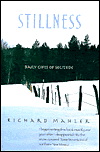
It takes nothing to appreciate peace and quiet. But for most of us, it's been a long time since we really did nothing. When I was a child, I loved Saturdays. Possibilities always seemed endless, stretching from early morning cartoons on to late night rock'n'roll on the AM radio. Weekdays were dominated by school. Sundays meant church, family gatherings, and homework. But, other than the obligation to do a few chores, Saturdays belonged to me.
I grew up during the 1950s in a small town in northern California, about thirty miles east of San Francisco. Our community was tight-knit, and the worst crime was teenage drag racing on Main Street during the wee hours. When Saturday rolled around, I spent leisurely hours hanging out with neighborhood boys about my age. We played games on front lawns, built elaborate treehouses, and used scrap wood to construct "coasters" to ride down Castle Hill Road. If the weather was lousy, we might go to the matinee or play Monopoly on a living room carpet.
Looking back on those years, I realize that on most Saturdays I also found time to explore silence and solitude. I was not conscious of this choice, but it must have been deliberate. Sometimes I would find a quiet place to read a book or draw pictures. I took hikes with my dog, Wibbles, through the nearby hills that were studded with California live oaks and carpeted with wildflowers. Other times I would explore the creek that flowed near our home, its banks a jungle of overhanging trees, sinuous vines, and thick brush. I discovered early on that if my dog and I kept still and silent, we could observe wild animals -- deer, raccoons, skunks, squirrels, turtles, frogs, and snakes. The rewards of quiet alone-time were self-evident.
Where Did All the Silence Go?
As I grew, my Saturday pockets of silence and solitude gradually disappeared. In college, I spent weekends visiting friends, studying, reading assigned texts, or writing papers, not to mention the much-disliked task of laundry. After graduation, when I began working full-time, Saturdays and Sundays filled with the necessary errands, socializing, and unfulfilled obligations held over from weekdays. The carefree hours of youth faded to distant memory.
In recalling that era now, the spaciousness of my days seems an inconceivable luxury, given my conviction as an adult that there is always more to do than there is time. Yet in the recent past I have accepted that it will never be possible to do everything I want, and that sometimes exploring unscheduled time is the best thing for me, as it was during childhood.
"It is not merely the trivial which clutters our lives but the important as well," concluded Anne Morrow Lindbergh in her memoir, Gift from the Sea. Even with clutter pruned away, a full and active life offers "too many worthy activities, valuable things, and interesting people."
A critical step in the embrace of silence and solitude is setting aside the notion that we have to be "doing something" throughout our waking hours. For most of us, this goes against what we have been taught since childhood: that being active and productive is the best way to proceed. Many factors feed into this, including the strong work ethic that has shaped American culture. Everywhere we turn, there is ample praise and support for the individual who strives to "get ahead." When we are idle, by definition, we are not striving and therefore going against the grain of social imperatives.
Making An Appointment with Silence and Solitude
 From the outset, we must give ourselves permission to set an appointment to experience silence and solitude, setting aside the baggage of negative connotations that may be associated with "nondoing." Some may regard carving quiet alone-time out of a full agenda as a kind of cop-out. From this mindset, we are escaping reality, feeling sorry for ourselves, shirking responsibility, or, at best, wasting time. In our culture, taking time for ourselves is "not being productive." Productivity is widely praised, with little regard to its human costs.
From the outset, we must give ourselves permission to set an appointment to experience silence and solitude, setting aside the baggage of negative connotations that may be associated with "nondoing." Some may regard carving quiet alone-time out of a full agenda as a kind of cop-out. From this mindset, we are escaping reality, feeling sorry for ourselves, shirking responsibility, or, at best, wasting time. In our culture, taking time for ourselves is "not being productive." Productivity is widely praised, with little regard to its human costs.
Many of us live on tight budgets, working overtime or taking a second job to make ends meet. With so much demanded of us for mere economic survival, stopping to experience silence and solitude may seem irresponsible at best. Living within strict financial limits, there seems no real need for introspection, thinking we know what is going on: "I'm simply trying to get by as best as I can!"
The irony is that an ongoing adoption of quiet alone-time potentially heightens awareness of what's really going on in our lives, which in turn may contribute directly to a balanced, healthy lifestyle and rewarding personal growth. From a purely practical standpoint, such ostensible nonactivity may "pay for itself" by helping us become more efficient, perceptive, and focused in how we spend all other waking hours. We may even become more "productive."
What's The Payoff?
Looking inward does not necessarily lead to noble insight or poetic inspiration -- though these may present themselves -- but it usually coaxes out the significant truths of everyday existence:
"My daughter was trying to tell me something last Thursday and I didn't really hear her."
"I am happiest at work when someone comments favorably on the good job I've done"
"My stomach hurts and I get irritable when I drink too much coffee"
"I have let an important friendship wither because of laziness and neglect."
Feeling that there is some kind of payoff to exploring quiet alone-time is essential for most of us, since we tend not to go beyond the ruts of our conditioned behaviors unless we anticipate a likely benefit. This can get tricky, since the transformations we notice within the context of silence and solitude derive from the experience itself. If we get too attached to the expectation and desire for a specific outcome -- "good" or "bad" -- we may either ignore other equally informative results or influence the experience while it is happening to us. We need to trust that something worthy will happen, based on the reports of others and our own intuition, and plunge ahead on faith.
Silent Moments: A Form of Preventative Medicine
 Despite my conviction that quiet alone-time is good for me, I still find it challenging to find time each day for a little silence and solitude. Sometimes my entire day is planned in minute-by-minute increments, with scarcely time to use the bathroom or grab a sandwich. At such times my body feels rigid with tension, even after eight hours of sleep. The last thing I want is to sit calmly with my eyes closed, performing a ritual that nonetheless has been part of my routine for many years.
Despite my conviction that quiet alone-time is good for me, I still find it challenging to find time each day for a little silence and solitude. Sometimes my entire day is planned in minute-by-minute increments, with scarcely time to use the bathroom or grab a sandwich. At such times my body feels rigid with tension, even after eight hours of sleep. The last thing I want is to sit calmly with my eyes closed, performing a ritual that nonetheless has been part of my routine for many years.
I have learned that these jammed-to-overflowing days are precisely the ones during which I feel the most tangible and far-reaching effects of my quiet alone-time. Instead of turning away from this nourishing ritual, I must turn toward it. This effort can be very challenging when I am feeling overloaded and stressed out.
I realize I am not taking time to inhabit silence and solitude each day; I am making time for it. The distinction is important because it reflects my trust in the worthiness of what quiet alone-time provides me. If I did not truly believe that my life would be different for having made this effort, I would have abandoned it long ago. This self-assurance depends on the kind of steadfast "knowing" that one must also come to if the embrace of silence and solitude is to realize its full potential.
Breaking our cycles of rote behavior can be exhausting and frustrating. The power of long-held habits seems inexorable, as anyone knows who has tried to do something as "simple" as modifying unhealthy eating habits. Knowing this fact of human nature, it helps to embrace solitude and silence with a non-judging mind, a light heart, and an optimistic attitude. A new ritual is unlikely to take hold the first time we try it; we may need to repeat the effort a hundred times or more before it becomes part of our daily routine.
Give yourself room to fail, recommitting again and again to your embrace of quiet alone-time--as often as necessary. Praise yourself every time you find a space that allows you to be quiet and alone -- even for ten minutes -- within the fullness of your busy life. Don't try to do too much, since bigger failures tend to discourage us more than small ones. Even making a tiny attempt to embrace silence and solitude is in itself a generous, healthy, and hopeful act. It is a self-loving gift that carries many ramifications. Be gentle and kind to yourself as you try to make room for contemplative stillness in your life.
FIVE WAYS TO GET STARTED
1. Make a personalized "inventory" of times and places in your schedule that you feel would best accommodate an ongoing embrace of silence and solitude.
2. Mark "quiet alone-time" on your calendar, the same way you would note a business appointment or a trip to the dentist. This will give these moments the respect they deserve.
3. Notice how you respond -- emotionally, physically, psychologically -- when your life feels overcrowded, out of control, or excessively noisy. At the same time, pay attention to your feelings when moments of silence and solitude come along. Ask yourself; "What can I learn from these experiences?"
4. When you inhabit quiet alone-time, turn off the phone, lock the door, ignore your e-mail, and resist the temptation to read or listen to music. Instead, disconnect from all extraneous "input" so that you may find stillness within.
5. Talk to those closest to you -- your spouse, partner, children, parents, siblings, best friend -- about the ways you and they relate to silence and solitude, to noise and congestion, to distractions and overloads. Feel free to express whatever concerns each of you may have about carving out time for yourselves to be quiet and alone.
One Step at a Time, One Minute at a Time
 As much as I enjoyed interacting with others, I wanted space in which I could interact with myself. When I did find intervals of downtime, being alone for an hour or two felt wonderful: luxurious, healing, calming, and exhilarating. I both needed and wanted to make a new habit out of creating these oasis-like islands of serenity. The pertinent question was, "How?" The answer sounded simple: "Figure out a way to disconnect from distractions and set an appointment with myself to be quiet and alone." But, as we all know, the simplest goals are often the most difficult to achieve.
As much as I enjoyed interacting with others, I wanted space in which I could interact with myself. When I did find intervals of downtime, being alone for an hour or two felt wonderful: luxurious, healing, calming, and exhilarating. I both needed and wanted to make a new habit out of creating these oasis-like islands of serenity. The pertinent question was, "How?" The answer sounded simple: "Figure out a way to disconnect from distractions and set an appointment with myself to be quiet and alone." But, as we all know, the simplest goals are often the most difficult to achieve.
"You need to start slowly, with baby steps," advised a friend, whose long-time experience as a teacher had rendered many truths about how people learn. "If you take on too much," Karen said, "you are likely to feel overwhelmed and discouraged. Set a realistic target of settling down for about fifteen minutes each day. Once you've made this a habit, you can try making your island of calm a little bigger."
I did as Karen suggested, and I discovered that disconnecting from my overbooked life was not so difficult after all. And because my experiences with silence and solitude felt so rewarding, I rarely felt I was giving up anything of greater importance.
Reprinted with permission of the publisher,
Red Wheel/Weiser, ©1990. www.redwheelweiser.com
Article Source
Stillness: Daily Gifts of Solitude
by Richard Mahler.

Since most people in the Western world exist in a hectic environment filled with noise, crowds and distractions, the author argues that seeking out regular periods of quiet, through meditation, yoga or spending time alone outdoors will reduce stress and may lead to a simpler existence, one with a slower, more personally satisfying pace of life.
About the Author
Richard Mahler is a writer who lives in Santa Fe when he isn't off in the wilderness alone. He has written widely about travel, the environment, spirituality, and politics. Author of eight books including Secrets of Becoming a Late Bloomer and Tending the Earth, Mending the Spirit, Richard also teaches a form of stress reduction that relies on meditation and yoga. Visit his website at www.richardmahler.com.
More Books by this Author
at InnerSelf Market and Amazon





























